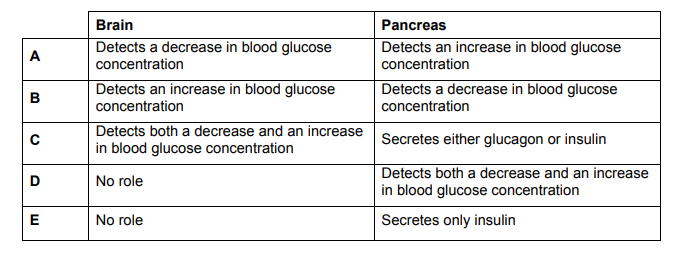Which answer correctly identifies roles of the brain and the pancreas in the normal physiological regulation of the concentration of glucose in the blood?

Which answer correctly identifies roles of the brain and the pancreas in the normal physiological regulation of the concentration of glucose in the blood?

Tricky question. But if you have studied the following material, you sure know that The pancreas maintains the body’s blood glucose ( sugar ) balance. Primary hormones of the pancreas include insulin and glucagon, and both regulate blood glucose . The Brain does not have a rule in this type of pathway.
The Pancrease also recognizes the levels of sugar in the blood by having special channels and pathways which allow the different hormones to be released by the alpha and beta-pancreatic cells, but this process is above the IMAT level.
The Answer Is D
A small proportion (1-2 percent) of the pancreas is made up of other types of cells called islets of Langerhans. These cells sit in tiny groups, like small islands, scattered throughout the tissue of the pancreas. The islets of Langerhans contain alpha cells which secrete glucagon and beta cells which secrete insulin.
Insulin and glucagon are hormones that work to regulate the level of sugar (glucose) in the body to keep it within a healthy range. Unlike the acinar cells, the islets of Langerhans do not have ducts and secrete insulin and glucagon directly into the bloodstream.
Depending on what you’ve eaten, how much exercise your muscles are doing, and how active your body cells are, the amount of glucose in your bloodstream and cells varies. These 2 hormones have the job of keeping tight control of the amount of glucose in your blood so that it doesn’t rise or fall outside of healthy limits
(mydr.com.au)
Doesn’t hypothalamus plays a role in regulating blood glucose levels.
The hypothalamus does not have a role in regulating blood glucose levels. It sits above the pituitary gland and regulates the release of hormones from the gland. Moreover, it is able to detect changes in body temperature. It can also detect whether or not the blood plasma is too hypertonic or hypertonic. If it is too hypertonic, it sends a signal to the posterior lobe of the pituitary gland to release ADH (vasopressin or antidiuretic hormone).